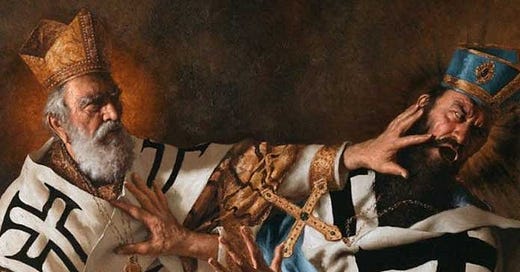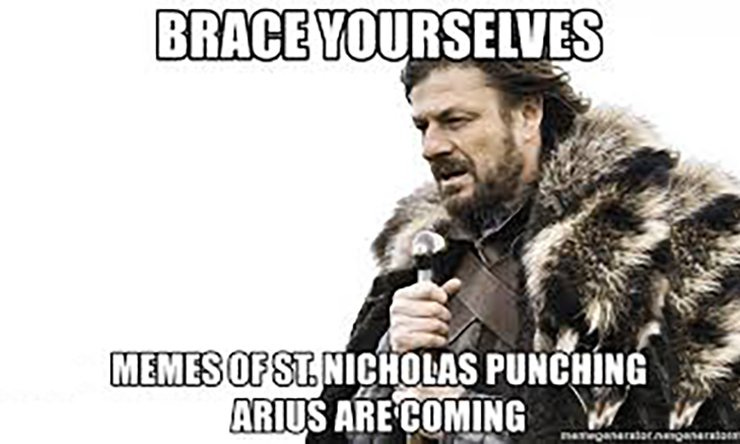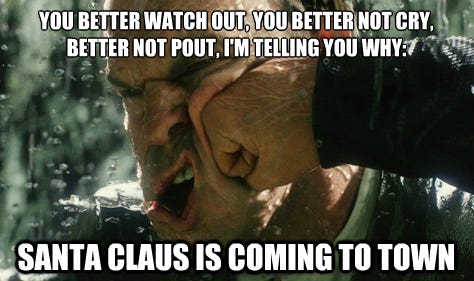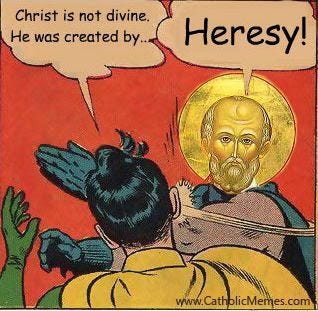[Ed. note: This is a bonus post for today, since the Gospel reading for St. Nicholas’s Feast Day is Luke’s version of the story we heard last Saturday.]
Debate on the proper way to depict St. Nicholas / Santa Claus is just one skirmish in the War on Christmas, which itself is but a single front on the Great Culture Wars.1
At the risk of dissecting a frog, I want to examine these colorful memes, why they’re funny, and whether or not they’re appropriate.
Slap Fight
In recent years, it’s been a trend to jokingly refer to St. Nicholas punching Arius at the Council of Nicea. (You know, the one where we get the Nicean Creed from.)
The thing is, the story as known in popular culture isn’t really accurate.
First, it wasn’t a punch, it was a slap.
Also, it probably wasn’t Arius himself, but some other Arian.
And St. Nicholas may not have even been at the Council of Nicea, anyway.
How Jokes Work
“So what?” I hear you asking. “It’s just a joke.”
I’ll tell you so what. All jokes, from an one-liner to a visual gag to a pun to a pratfall, involve two parts: a premise and a punchline.2 The premise must be true, or at least believed to be true by the audience. When you say "I don't get it," this is what you're referring to; you either don’t understand the premise or you don’t believe it.3

You can also couch this in the language of expectations and subversions. You wouldn’t expect St. Nicholas to reference They Live to threaten Arians, since the movie was released several centuries after his death. And yet—
But even given the silliness of quoting Rowdy Roddy Piper, the supporting premise is still that St. Nicholas punched heretics. The joke simply isn’t funny if you aren’t familiar with this apocryphal story (and John Carpenter’s magnum opus).
Yeah, But Still-
“What’s the big deal?” I assume you’re writing in the comments at this point.
There’s a kind of counter-counter narrative going on now, the idea being that not only do these memes glorify violence, but disrespect the memory of a venerated saint by misrepresenting his actions.
While agree it does kind of feed into the visceral pleasure of imagining a theological fistfight, I think there’s something else going on here.
While most people can’t4 articulate the premise/punchline dynamic, they understand it intuitively. When you watch a topical comedian, like on a late night show, you'll often not get some jokes if you haven't been following the news of the day. But through the presentation of the joke, you'll be able to reverse-engineer the premise to comprehend what the comedian is getting at. (This usually helps you understand the next few jokes, if he stays on topic.)
Take the following two examples:
If you were unfamiliar with the Arian heresy,5 from these two jokes alone you could put together than Arius was a heretic who denied that God the Father and God the Son were two persons of the Holy Trinity (with the Holy Spirit being the third).
You still need to have a lot of basic cultural knowledge, like the lyrics to “Santa Claus Is Coming to Town,” the fact that Santa and St. Nicholas are the same person, and even that heresy is a thing. An alien wouldn’t get it, but most Americans who are reasonably practicing Catholics would.
If you go to mass on Sunday, but aren’t familiar with the Council of Nicea or the Arian Heresy, you might be curious what all these memes on your Facebook wall are about. If it really struck your curiosity, you might actually go and look these things up, and learn a little bit more about the Faith.
Humor can be a powerful evangelizing tool. It can subtly instruct the listener while also entertaining them, making it stick longer. We only have one record of Jesus telling a joke (that I know of), but I guarantee you that he wouldn’t have been able to hold 5,000 people enthralled to the point that they forgot to eat dinner if he hadn’t cracked a few jokes along the way.
So, are these memes denigrating a saint? Or is St. Nicholas sanctifying memery?
I think it’s the latter. Let me know what you think in the comments.
I realize those are all loaded terms. But they’re also funny, so roll with it.
For a more detailed analysis, read What Are You Laughing At?: A Comprehensive Guide to the Comedic Event, by Dan O'Shannon. It’s not going to make you funny, but it will help you understand what makes something funny.
Which is why political jokes are so difficult; half your audience won’t find the joke funny if they don’t agree with the underlying suppositions.
Or won’t.
Which I just realized you might be, because I haven’t actually explained it in this post.















